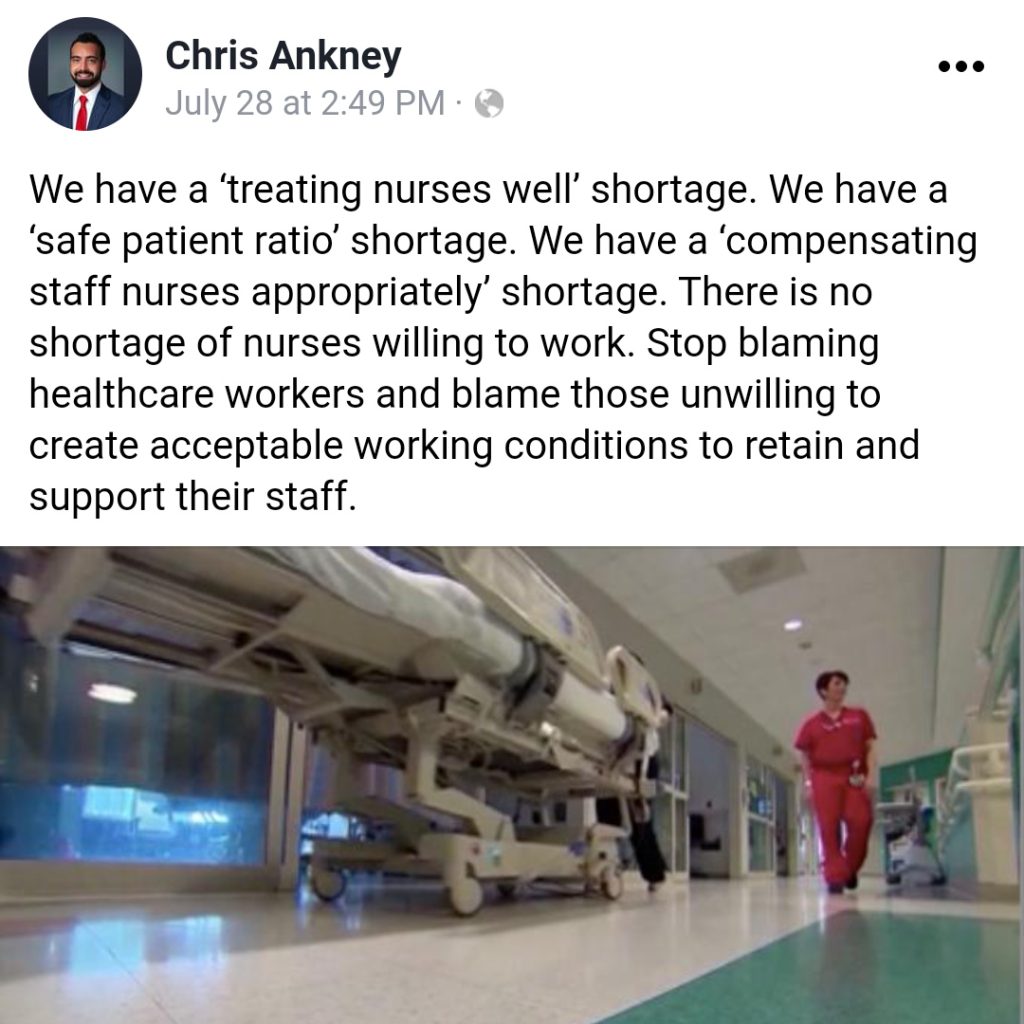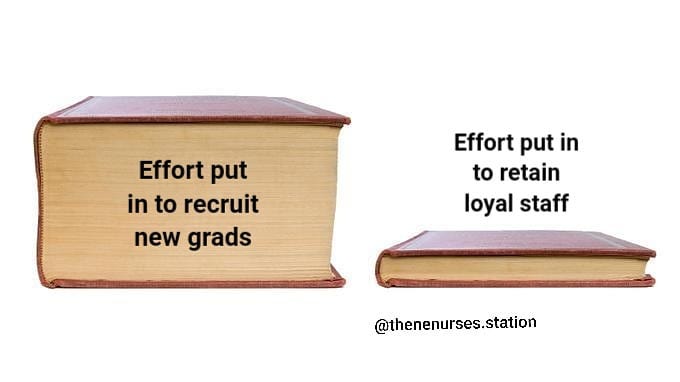“They’re hiring new nurses for big $$, but their experienced nurses who run the units, save their asses in staffing gaps, and keep patients alive are leaving.”
It’s a blunt way to put it, but Twitter user SarahToninFNP is not wrong.
Nurse employers are piling on the bonuses for new hires, as we told you last month. Which is great for nurses who can move jobs — and hey, after everything nurses have suffered through these last two years, we’re not going to begrudge them the windfall income! (We even provided some useful advice if you’re considering making the jump.)
But it might also be beside the point. Sign-on bonuses are not going to stop your existing staff from leaving. They do nothing to solve the reasons why your existing staff is leaving. And as long as your existing staff keeps leaving, you’re going to have to keep shelling out more sign-on bonuses for ever new nurses. Who are likely to be less experienced. The end result is spending more for a less qualified staff.
No wonder most of you were incredulous when we posted a poll about those sign-on bonuses. Sure, they look great — and go get that bread if you can. But a majority of you was left wondering whether they’ve all gone mad. And we’ve kind of got to think you’ve got a point!
An elaborate exercise in avoiding the real problems?
Basically, solving a nurse retention problem with sign-on bonuses is like trying to plug a leak by pouring on more water. We can’t escape the impression that it’s an elaborate exercise in avoiding the real problems — and an expensive one at that.
We understand: it works in the short term, and right now hospitals are just trying to stay afloat. Sometimes you’ve got to do what you’ve got to do to live another day. Because the underlying problems are dauntingly difficult to take on.
To sum up, every nurse can confirm the basics about these past two years: the pandemic has triggered the largest retirement of nurses ever recorded. Six in ten health care workers say the pandemic has burned them out. Nurses “have accounted for 32% of all health-care-worker–related deaths owing to COVID,” losing their lives “at nearly twice the rate of physicians”. Multiple studies on the consequences of the pandemic have painted “a picture of a workforce that is burnt out and suffering from a variety of adverse mental and physical health effects.”
But most of this didn’t start with the pandemic either: Covid-19 only “made an already untenable situation even worse”. Even before the pandemic, as many as half of the over 150,000 registered nurses who joined the profession each year left the bedside within two years. That’s a stunning number. Between 17.5% and 30% of new graduate nurses leave their first job within the first year, Dr. Dr. Anne Dabrow Woods told Becker’s Hospital Review. In some sectors, things are even worse: nursing homes saw an average turnover rate of over 140% in 2017 and 2018. That’s an obviously unsustainable rate of turnover, which no sign-on bonuses can solve.
Nurses have long “struggled with low pay, long hours and inadequate staffing,” and the pandemic merely highlighted those issues, ANA President Ernest Grant warned. As long as that’s the case, hospitals and long-term care facilities will keep seeing older nurses retire and others simply move on to other jobs, he added. The president of the John A. Hartford Foundation, Terry Fulmer, summed it up plainly: “Nurses and nursing assistants are underpaid, undervalued, and do dangerous work every day”.
Listen to the nurses. Listen to the experts.
Now, of course, no individual manager can tackle this whole hulking set of problems by themselves. But sooner or later, employers that are used to solve nurse shortages with expensive travel nurses, bonuses, or more often than not just forcing their nurses to care for more patients with fewer colleagues, will have to start looking for other kinds of strategies. Because forcing your staff to work with unsafe nurse-patient ratios will just chase them away faster, and simply relying on the educational pipelines providing ever more new nurses to cycle through won’t work.
“We’ve doubled the number of nurses graduating to over 160,000 nurses every year, compared to 70,000 15 years ago,” nursing professor Linda Aiken pointed out to The Intercept. “Why didn’t that make a difference? The fact is that these hospitals are.. not offering employment opportunities that are satisfactory to nurses.” And nurses have been telling them: “wages aren’t high enough, the work is made more dangerous by a depleted staff, and management doesn’t listen to their concerns”.
So instead of offering mandatory “resilience” trainings, employers would do well to listen to some of the free advice that’s available out there. Listen to what the nurses on their own work floor are telling them about what their real problems are. Call it the five S’s: staffing, scheduling, salaries, safety, shared governance. And listen to how business and nursing experts are breaking down the issue.
On that count, we’re highlighting two great, recent articles in particular below!
-Where are retention bonuses to keep current nurses?
-Ask frontline nurses what they need to maintain their health & well-being.
-Do nurses feel their nurse-patient ratios are safe and enable them to provide optimal care?— Susan Allison-Dean,RN,MS, AHN-BC,CCAP (@TheNatureNurse2) August 25, 2021
Four practical strategies that will persuade nurses to stay
Dr. Dan Weberg, Head of Clinical Innovation at Trusted Health, broke down four strategies to start with in MedCity News.
- “Prioritize moving nurses in distress away from the bedside”
Some of the frontline nurses who have “reported a diminished commitment to the profession,” he writes, “are suffering from trauma and extreme distress, and simply need to be re-assigned. Nurse leaders need to meet with members of their staff individually and move nurses who are in periods of mental distress from the most demanding units into less acute roles or away from the bedside entirely.”
- “Create career planning programs”
What’s pushing nurses out of the profession within just a couple of years after entering, when they spent such enormous effort and capital on getting their qualifications? “One of the major drivers,” Weberg argues, is “a feeling among nurses that they are treated as disposable by their facilities, and worked to the point of exhaustion without much concern for their well-being or career progression”.
That’s why employers themselves would benefit as well from spending some of the financial and organizational resources that now go to replacing these nurses as they drop out on listening to them instead. “Hospitals need to create a structured approach to career planning that starts with helping nurses determine what kind path appeals to them — leadership, education, or clinical — and then working to develop timelines, identify opportunities, and provide mentorship.”
- “Drop the “hero” label”
One look at the nursing subreddit pretty much any time this past year and a half could have told them this: “Hospitals need to ditch the “Heroes Work Here” banners and other gestures like yoga classes and pizza parties.” They’re cheap substitutes for addressing real needs, and nurses can see right through it. At best, nurses are ambivalent about being called heroes — and many just feel it’s manipulative, implying they should “sacrifice their health and well-being for others”.
Instead, invest at least some of the budget now spent on travel nurses, sign-on bonuses and advertising to replace burnt out staff in mental health programs, crisis support and peer-to-peer counseling to keep them from dropping out.
Oh, and here’s something we’d add: please don’t actually frame those programs in terms of “building resilience and coping skills” either. (And don’t even think of offering “gratitude practice for nurses“). It places the responsibility and burden on the nurse and suggests it’s their own shortcomings that make them suffer. It’s not about that. It’s about providing the support they deserve.
- “Rethink nurse staffing”
Many nurses took on travel nurse jobs for the first time during the pandemic, and discovered they like the freedom and flexibility of travel nursing as well as the higher salaries that come with it. “To give these nurses the optionality they are looking for without paying the high fees” of travel nursing, “hospitals and health systems need to [look] holistically at data around staff PTO, census, fill rate and more to identify the best fulfillment strategy”.
Looking at the individual circumstances of nurses and what might be keeping them from taking on the shifts an employer would like them to work would be helpful too, we’d suggest. Could it be possible to provide free or low-cost on-site day care, to facilitate the work of nurses who are juggling their job with parenthood, for example? In any case, if you don’t listen to your nurses and you end up “forcing nurses to work overtime, or conversely, to beg for extra shift work,” you’re sure to just see more and more of them sign off altogether.
Or at least give staff what they want- like flexible self scheduling, retention bonuses or just higher wages, more say in decision making, staffing ratios, child care assistance, etc. my institution just got rid of their tuition reimbursement for higher Ed…. Like wtf?!
— Sarahtonin’ FNP-C (@MomRobe) August 25, 2021
It can be done: a nurse retention rate of 93%
Here’s our other reading tip for your managers: America’s nurse shortage is a crisis in the making. Training nurses to be leaders could solve it. Written by Rebecca Love, the president of the Society of Nurse Scientists, Innovators, Entrepreneurs & Leaders, and Daniel Pianko, cofounder of University Ventures.
They know the grim realities of how many of you feel: “Being a nurse is increasingly viewed as a job that has few career growth opportunities and where the risks on the front lines outweigh the benefits of a solid paycheck.”
They also knows the flip side of the coin: hospitals and systems are “struggling to fill more senior or specialized positions,” from hospital administration to specialty areas like infectious disease or intensive care and “fields like quality control and reporting, health IT, and data analytics”.
All jobs which typically require significant health care experience — which veteran nurses already have. But instead, they’re turning to outsiders with no such experience, and are then surprised that “the clinical and administrative sides of health systems” don’t get along.
So “the question here should be obvious,“ they conclude. “What if health care systems invested in educating their existing nursing workforce to prepare them as leaders in the business of health care?” It kills two birds with one stone, keeping your nurses on board for longer while preparing them to fill other gaps in your organization.
Naive or idealistic? But it can be done, they point out. At Sunrise Hospital in Las Vegas, the StaRN program saw the year-over-year nurse retention rate rise from “around 50%” to “a new high of 93%—demonstrating that investing in nurses, even just within their first years of nursing, can help health systems attract and keep talent.”
It’s not like this is some wild new idea. Health care systems that “used to pay to educate nurses” have actually decreased such investments. The result is that, more than ever, “the onus of continuing education costs” falls on the backs of nurses themselves, who already start their career with an average $47,000 in student loan debt.
But for their employers, this has backfired. “Today, if a nurse looks for career advancement, he or she must often leave the workforce to take advanced coursework.” They’re off to spend tens of thousands of dollars more with no guarantee of a job at the end, and in the meantime they are lost to nursing. If you’re looking to solve the problem with more money, investing in tuition reimbursement or a student loan repayment assistance program rather than sign-on bonuses might help keep your existing staff from dropping out — and yield you more qualified nurses to boot.
Employers love to talk about efficiency: well, here they can find some promising efficiency gains that would benefit nurses as well:
Hospitals and other health care providers [are] not seeing the potential of the bedside position as being the first step on a path to higher-paying, more specialized careers in health care… Simply put, investing in nursing is a smart business decision in health care… The reason we lose half our trained nurses each year is that we fail to invest in them. It’s time for the health care system to see nurses for the resource they are… It’s time to invest in their future.
Rebecca Love and Daniel Pianko





Daniela Cox
We need healthcare workers, especially nurses, now more than ever! But people are getting burnt out and leaving the medical field all together. What helped me not burn out? A resource position that let’s me make the schedule I want even if that means I work some 8 hr shifts instead of 12s all the time. Better to have an experienced nurse working some than none at all, right? You know what’s NOT ok? Mandatory overtime. That’s happening way too often to poor nurses. And yeah, don’t reward the newcomers. Reward the people who have been fighting the good fight for years, give them a reason to stick around. Help us out by allowing the reduced nursing documentation when ICU nurses are taking 4 vented patients. Stop getting us cookies and get us healthy delicious snacks. Make sure your nurses are encouraged to leave the phone and headset behind and take an actual 30 min lunch and if they can’t take it don’t shame them when they clock out “no lunch”.
Karen Roberts
I’ve been nurse for 31 yrs as Registered nurse was lpn for 8 and can for 1yr starting out and I have never seen so much controversy in my whole life. When they say you will be at top out pay when Appling for new job after I’d been in what I thought would have been different surroundings. Had been hired on for sign on bonus with partial after 30 days the partial after 1 yr and rest after 2 yrs only to be told I wasn’t quite up to their performance after 30 days. Kept being put on probation and after 40 days I was let go so here I am looking for yet again another job scarry out there.
Beth downing
I have been a registered nurse for since 1973, a long time. In all that time nothing has changed with nurse retention. Administration just looks at numbers and considers a new Rn the same as a nurse with years of experience. I doubt that they are ever going to change.
Lisa Treuting
I have been a practicing RN since 1982.
My observation is that Hospital corporations are top heavy with administrators making huge salaries who don’t understand the demands of bedside nursing.I firmly believe that to admin nurses are just numbers on their corporate staffing matrix sheet which just barely meets the recommend safe nurse-patient ratios. Nurse retention starts with simple things like self scheduling and access to the cafeteria for all shifts every day. I’ve never understood why patient care is 24-7, but concern for employees is strictly day hours. It makes people feel unappreciated. Childcare onsite would be a huge help to employees as well. It doesn’t need to be free. When admin starts considering treatment and respect as essential, employees will want to stay.